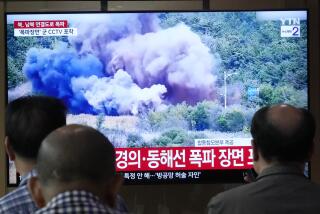Seoul Holds Steady Despite Sea Skirmish
- Share via
SEOUL — Having destroyed two North Korean ships and damaged five more in a naval battle Tuesday, South Korea announced later in the day that it would persevere in efforts to improve relations with its belligerent northern neighbor.
A South Korean ship full of fertilizer, which had been scheduled to set sail Tuesday for North Korea, had to postpone its departure because it was due to go through the area of the Yellow Sea where the firefight broke out earlier, government spokesmen said. But there was no discussion here, at least in public, of canceling the aid shipment.
And a ship carrying 590 South Korean tourists toward North Korea’s premier sightseeing attraction, Mt. Kumgang, departed as expected. Only 18 passengers canceled.
North Korea sent a message saying it would guarantee the safety of the tourists, as well as of the South Korean construction workers who are building a nuclear power plant in North Korea, said Park Chung Ho, a spokesman for South Korean President Kim Dae Jung.
The South Korean government also saw no reason why a meeting with North Korean officials, scheduled for Monday in Beijing, should not take place, said Hwang Won Tak, secretary of the National Security Council. The meeting of vice foreign ministers had been called to discuss permitting reunions among families separated by the 1945 partition of the Korean peninsula.
Tuesday’s naval clash occurred about 60 miles northwest of Seoul in contested waters that are rich fishing grounds for a lucrative species of crab.
South Korea charged that northern forces fired first and demanded an apology for what it called the “infiltration.” North Korea in turn said it was owed an apology, accusing the South of bringing the two nations “to the brink of war.”
The state-run North Korean news service reported that one of the North’s warships had been sunk and three others damaged.
South Korea said a 40-ton North Korean torpedo boat capable of carrying 12 to 16 people had been sunk, and its crew was presumed dead. A 155-ton North Korean patrol boat that could carry “several tens of crew members” was half-submerged and drifting. A Defense Ministry spokesman said South Korean forces had not seen any North Korean crew members being rescued.
Four other North Korean boats and two South Korean boats also were damaged in the shootout, southern officials said.
Seoul issued a stern protest and warned that any future North Korean provocation would be countered “with full force.” But South Korean officials insisted that it was important to maintain a policy of offering the North peaceful coexistence while tolerating no aggression.
The debate in Seoul over how to handle relations with North Korea mirrors the ideological divide in Washington between the Clinton administration, which sees no practical alternative to engagement with the North, and a Republican-led Congress that accuses the administration of feeding and coddling an unreconstructed “rogue nation.”
In South Korea, the opposition Grand National Party and other critics have attacked as appeasement Kim’s 16-month-old “Sunshine Policy” of pursuing better relations with the North. On Tuesday, the party called for a cutoff of aid and exchanges between the two Koreas.
Today’s editions of the conservative Chosun Ilbo newspaper carried an editorial arguing that the Yellow Sea shootout demands “a full-scale review” of the Sunshine Policy. For ideological reasons, North Korean leader Kim Jong Il requires a South Korean enemy for his regime’s survival, the newspaper argued.
So far, however, polls indicate that a majority of South Koreans favor a policy of engagement. A Hangyoreh newspaper poll of 600 adults in February found that 54% of respondents supported a “package deal” that offers the North better relations with South Korea, the United States and Japan, while 28% were opposed.
While 53% said the South Korean government had not responded with appropriate measures to counter North Korean missile and nuclear development programs, almost 69% thought that North Korea should have normal diplomatic relations with the U.S. and Japan. Only 16% were opposed.
“Let’s face it, the stronger side can afford to be softer,” said Park Young Kyu, senior fellow at the Korea Institute for National Unification, a state-funded think tank that was until recently a bastion of hard-line containment views. Park argued that it is unrealistic to expect five decades of hostility and mistrust to be swept away overnight.
“All the Sunshine Policy means is that we provide them help, we assist them, and wait, wait patiently, for them to change . . . ,” Park said. “We have used the hard-line policy in the past and found out it is not effective.”
*
Chi Jung Nam in The Times’ Seoul Bureau contributed to this report.
More to Read
Sign up for Essential California
The most important California stories and recommendations in your inbox every morning.
You may occasionally receive promotional content from the Los Angeles Times.












